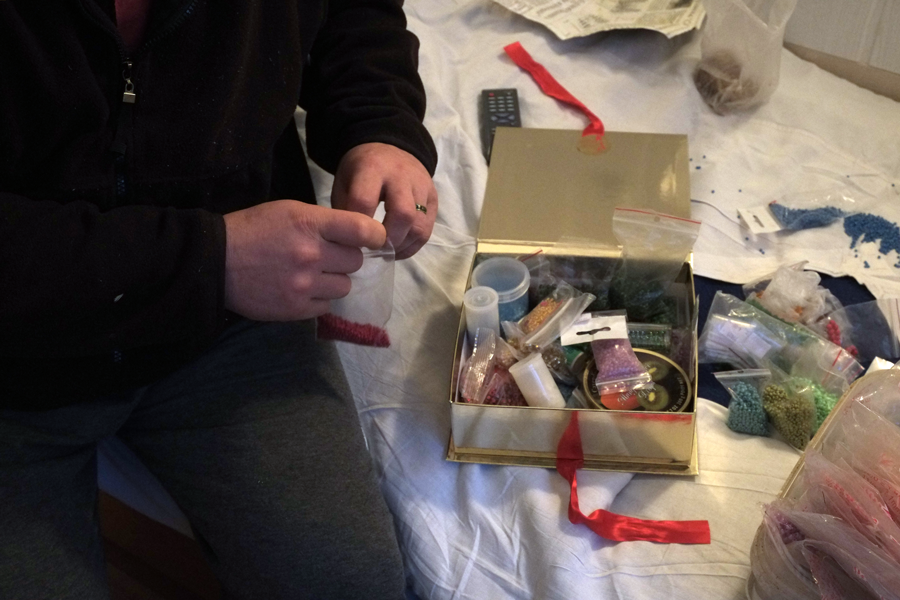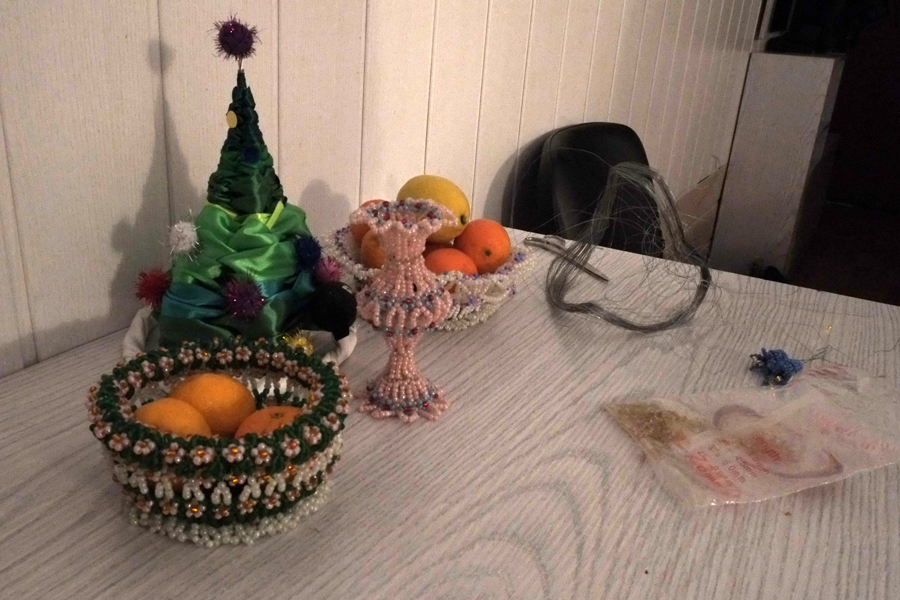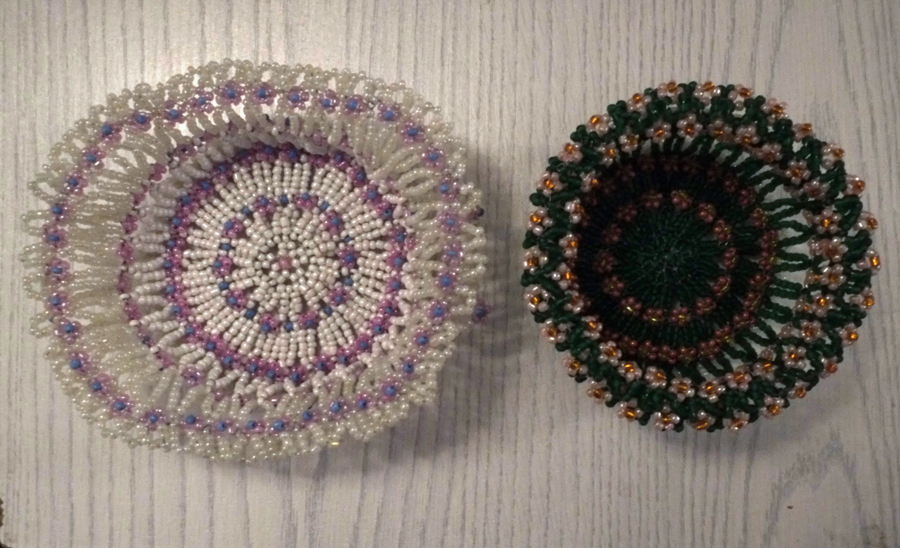Kyiv before the holidays looks like a Christmas ornament: festive lights on every corner, hand-made souvenirs in markets and subway shops. But tonight I will search for hand-made beaded jewelry at the Main Military Clinical Hospital.
"Each item is individual. Even I can't reproduce them. I use no schemes, I just bead until I feel it's ready," said Oleksandr Smyrnov, 41, a war veteran from Zhytomyr Oblast. Oleksandr survived the Battle of Debaltsevo, where he lost many of his brothers-in-arms. After two concussions and a spine fracture, the tank mechanic of the Armed Forces of Ukraine and father of two uses beading as his physical and social therapy. Smyrnov stutters a bit, has hearing issues and may face a second surgery after having spent over half a year in the hospital.
For this soldier though, beading is still no more than a hobby that helps his rehabilitation and gives him hope for a future business.

Beading after concussions
Four years ago, Oleksandr's daughter asked for help with homework for her handicraft class at school. This was how Oleksandr, then a construction worker, discovered an unexpected passion for beading and started making souvenirs for his family and friends. Oleksandr's mother and his daughter have always been his main critics when it came to beading, though his brother is a wickerwork master.
I use no schemes, I just bead until I feel it's ready. – Oleksandr Smyrnov, 41, Ukrainian war veteran.
Today, a hospital ward at the neurology department where Oleksandr is forced to stay even during the holidays, has turned into a tiny manufacturing center. When I ask the former tank mechanic to show the jewelry and accessories he's made, he shrugs his shoulders: almost everything has already been given away as presents to his brothers-in-arms, family and hospital roommates.
"Since my hobby brings joy to people and can bring me some income, I will try selling my beading. With a spinal trauma like mine, I may not be able to get back to construction work. Every creative person wants to sell his work. People like it, so why not?" He makes jewelry, tea and coffee sets, jewelry boxes, vases, and all kinds of accessories. Oleksandr has also made a couple of projects for theater decorations and historical reconstructions.
The only issue though is materials: both beads and wires are expensive, so Oleksandr's hospital roommate asked for donations through Facebook. It took only one day for the word to spread and strangers from all over the country started asking where they could ship materials or how to buy the finished product.
Oleksandr doesn't let his family visit him much
"You get into a fuss, you need to get yourself busy with something. Some veterans drink, some become aggressive. I get to beading and it takes away all my heavy thoughts". Oleksandr states that the war hasn't made anyone healthier and each of his brothers-in-arms now deals with the so-called "ATO syndrome" on his own.
During the attack in which Oleksandr was injured, his commander drew the fire on himself and saved the rest of his team. "Our commander was like a family member to us; thanks to him we are all alive now. You rarely meet a person like him among military commanders". Oleksandr states that family is the best place to seek help and rehabilitation, but during his half year in hospital he hasn't let his relatives visit him much.
Some veterans drink, some become aggressive. I get to beading and it takes away all my heavy thoughts. – Oleksandr Smyrnov, tank mechanic of the Armed Forces of Ukraine
"I don't want them to visit me too often. They have enough pain because of my injury. Speaking on the phone, you can always say it's all good. But when they see me, they start crying. I prefer having them call me".
Military hospital room as a meeting point
During winter holidays, the neurological department of the Main Military Clinical Hospital is quiet and half empty. Oleksandr's ward, though, is more lively. As we talk his phone rings often and the door seems to never close. Volunteers, handicraft masters, and children come to visit the soldier.
A souvenir Christmas tree on Oleksandr's table is a present from the children of the Nashi Dity charity center in Kyiv, where kids from troubled families get proper care. When they learned about Oleksandr's hobby, they invited him to a workshop at their center.


Oksana, who was giving shelter to activists from outside of the city two years ago during the revolution on Maidan, now brings home-made meals to the hospital where the majority of the patients come from outside of Kyiv and rarely get to see their families. She treats Oleksandr to the Ukrainian national dish holubtsi and is self-effacing when she discusses the time and effort she continues to give to the soldiers.
Nadia along with her 15-year old daughter Katya, met Oleksandr in May, when he had just arrived in the traumatology department after being injured in battle. During Maidan, Nadia, along with her husband were part of the Maidan Self-Defence squads. Today she and her daughter cook meals for the patients and prepare ready-to-cook borscht to send to the frontline.
Read also: How pizza made by Ukraine's war veterans is taking over Kyiv
Anna, who learned about Oleksandr's activities through Facebook and who is a beading master herself, brought materials and shared her beading tricks and techniques. Before the revolution, Anna used to go to Moscow to give beading workshops which, for her, was a profitable business – but not any more, which still doesn't make her regret events of last two years.
"If anyone told me that our people would give up all they had, [for] helping and caring about the strangers, I wouldn't have believed it", Oleksandr says as the door opens again and two other volunteers come in.

